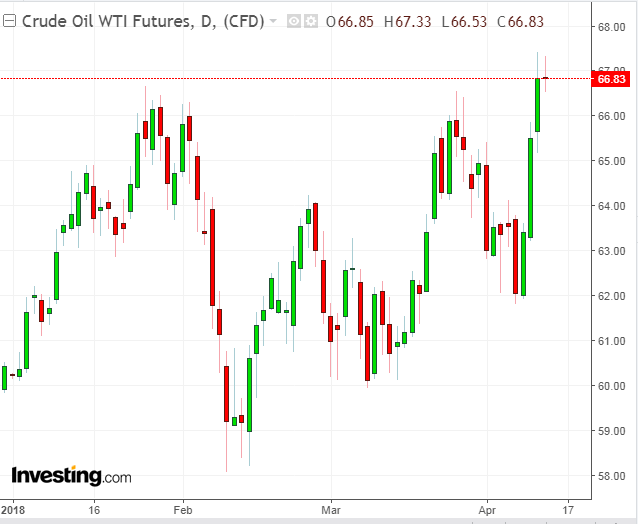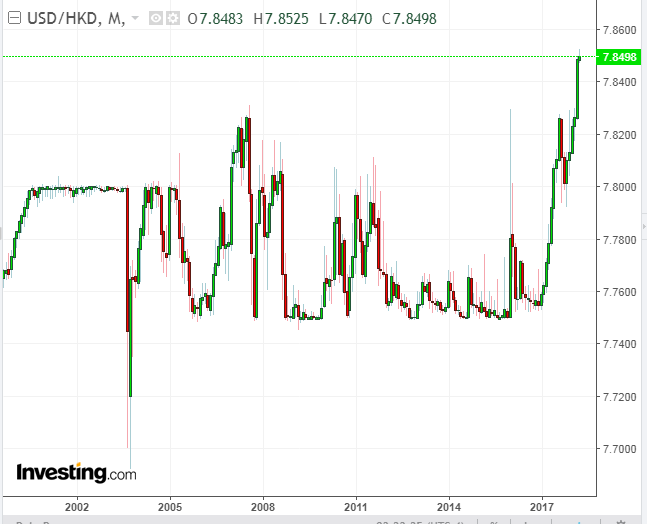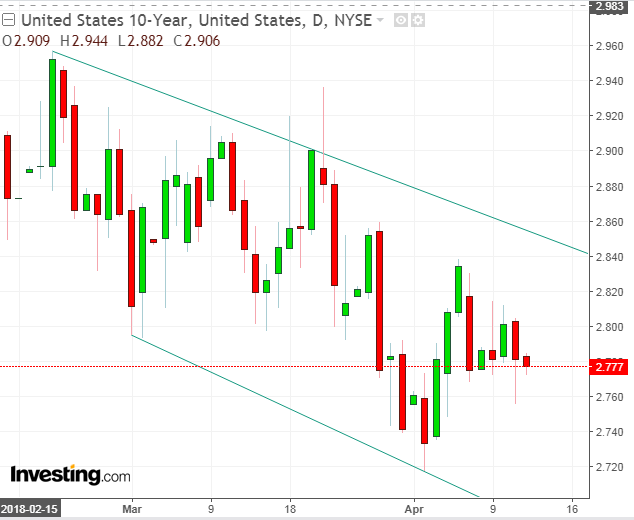-
International and domestic political jitters increase headwinds for equities
-
Simmering Middle East tensions push oil to 3-year high
-
Russian markets continue to spiral on fallout from US sanctions
-
Hong Kong dollar plunges to lowest level since central bank intervention
-
Highest US core inflation in a year further supports Fed's plans for faster policy tightening
Key Events
European stocks edged higher on Thursday morning alongside US futures for the S&P 500, the NASDAQ 100 and the Dow, following an Asian session that saw local exchanges plunge across-the-board. The US dollar ended a four day slide.
Oil company shares saved the STOXX Europe 600 from slumping, helping it to eke out a gain.
Mounting risk of war in the Middle East has pushed the price of WTI crude to its highest level in 3 years, after Trump's threat of a military head-to-head with Russia in Syria ignited fears of supply glitches. We expect oil to climb further, especially if Russia, which risks taking a major economic hit from the extended effects of US sanctions, withdraws from its commitment to oil production cuts.
Complicating the picture, Saudi-Iranian diplomatic tensions are also on the rise. Saudi Arabia, a US ally, is threatening to trigger a nuclear arms race if sanctions against Iran, Russia's ally, fail to be ratified. This would put Iran's cooperation on oil supply cuts into question.
Moreover, the main equity benchmarks in the UAE, Kuwait and Oman—including the ADX in Dubai, Kuwait's Premier Market and the MSM 30 in Oman—all slid today, amid growing concerns regarding US military action in the region.
Global Financial Affairs
During the Asian session, investors faced a deluge of geopolitical and economic risks, including increased likelihood of a faster pace of monetary policy tightening in the US, the escalating tensions in the Middle East and a fresh White House scandal after President Trump's vicious attack on Special Counsel Robert Mueller added yet more fuel to that fire.
Japan's TOPIX fell for a second day, posting a 0.37 percent loss for an aggregate two-day 0.8 percent decline. South Korea's KOSPI opened higher but ended lower, also extending losses to a second day, as did Australia's S&P/ASX 200, down 0.23%.
China's Shanghai Composite slipped 0.88 percent, while Hong Kong's Hang Seng opened 0.7 percent higher but began to fall immediately. It closed 0.21 percent in the red, halting a four-day advance and revealing the bearish foothold of that bullish attempt.
The Hong Kong dollar fell to the bottom of its targeted trading band for the first time since the range was set by the Hong Kong Monetary Authority (HKMA) in 2005. While triggering this key level raises the monetary watchdog's scrutiny, the South China Morning Post reported that the regulatory body will not intervene as long as banks are willing to pay 7.85 HKD per USD. The rate gap between the HKD and the USD prompted traders to borrow the local currency to buy the greenback in order to capitalize on the positive interest rate differential.
Gold and the Japanese yen weakened on the dollar's strength, while 10-year US Treasury yields edged lower, confirming widespread risk-off sentiment.
Yields have been trending downward since topping out at 2.957 percent on February 21, underscoring an overall risk-off mood, despite some extremely bullish sessions in global and US equity markets.
US core inflation saw its biggest annual gain in a year, boosted by reduced mobile-phone prices. Although there was little room for this milestone in an overcrowded market narrative, it stands to bolster the Fed's arguments for accelerating its tightening schedule, as revealed by the FOMC minutes.
Russia’s ruble slumped to a 16-month low and the country’s Finance Ministry canceled a weekly bond auction for the first time since 2015, as worries over Syria added to the US sanctions headache.
Copper retreated and aluminum pulled back after a six-day rally that took it close to a six-year high.
Up Ahead
-
Citigroup (NYSE:C) is scheduled to release corporate results before market open on Friday for the fiscal quarter ending in March, with a $1.62 EPS consensus vs $1.36 for same quarter last year. The global bank may be facing some unexpected headwinds going forward
-
JPMorgan Chase (NYSE:JPM) will also report earnings before market open, for the same fiscal quarter, with a $2.28 EPS forecast. The same quarter last year yielded $1.65 EPS.
Market Moves
Stocks
-
The STOXX Europe 600 fell 0.1 percent.
-
Futures on the S&P 500 Index climbed 0.1 percent.
-
The UK’s FTSE 100 declined 0.1 percent to 7,252.39.
-
Germany’s DAX dipped 0.2 percent.
-
The MSCI Emerging Market Index sank 0.2 percent.
Currencies
-
The Dollar Index gained 0.05 percent to 89.55, ending a four-day decline.
-
The Japanese yen dipped 0.1 percent to 106.86 per dollar.
-
The euro advanced less than 0.05 percent to $1.2368, reaching the strongest level in more than two weeks on its fifth straight advance.
-
The Turkish lira climbed 0.1 percent to 4.1334 per dollar.
Bonds
-
The yield on 10-year Treasurys dipped one basis point to 2.78 percent.
-
The yield on 2-year Treasurys fell less than one basis point to 2.30 percent.
-
Germany’s 10-year yield declined less than one basis point to 0.50 percent, the lowest in more than three months.
Commodities
-
Gold fell 0.1 percent to $1,351.85 an ounce, the first retreat in a week.
-
WTI crude climbed 0.4 percent to $67.06 a barrel, the highest in about three years.
-
The Bloomberg Commodity Index dropped 0.3 percent to 88.96, the largest dip in more than a week.



